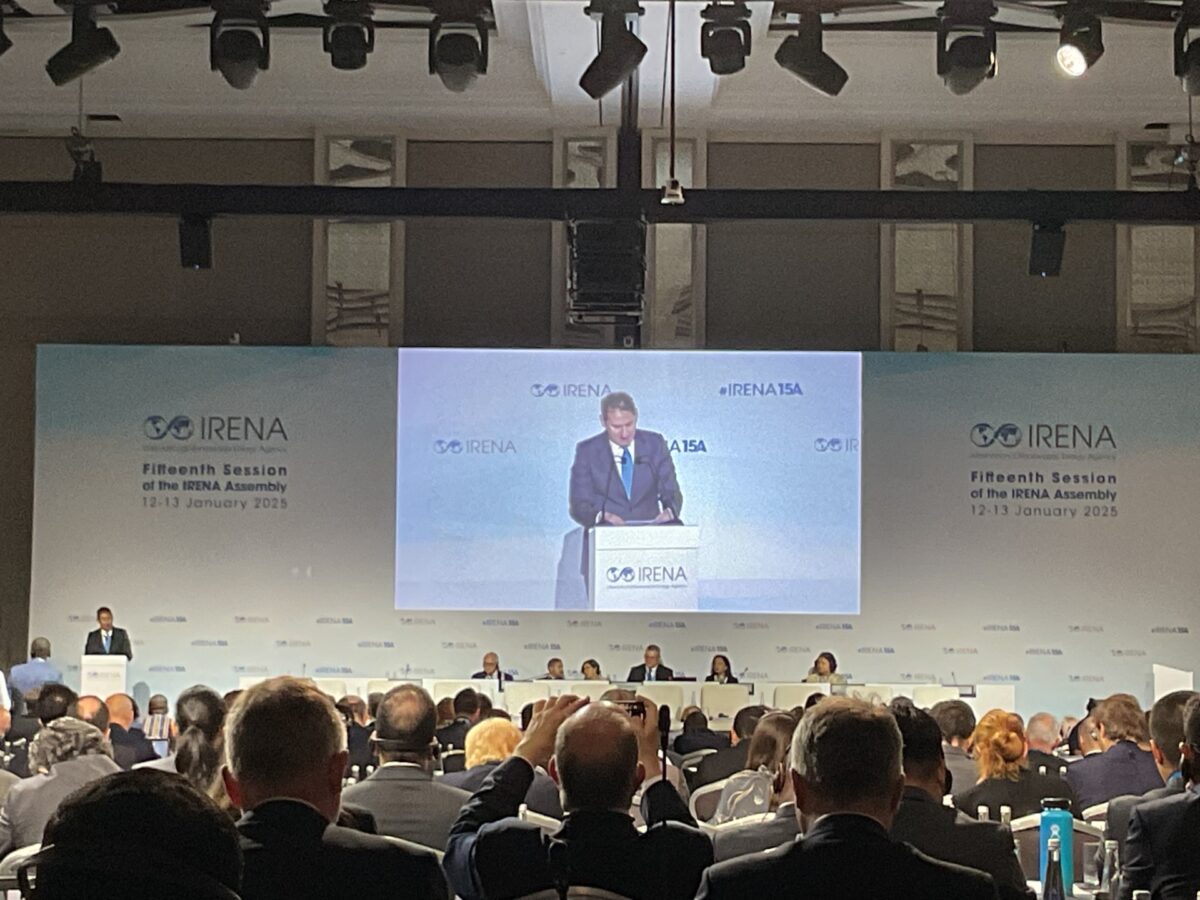Headline speakers at this year’s IRENA assembly in the United Arab Emirates (UAE) called for a more equitable distribution of finance to help the global south overcome energy-related challenges causing widespread inequalities.
‘Accelerating the Renewable Energy Transition – The Way Forward,’ was the theme for this year’s IRENA assembly, which convened on Jan. 12 in Abu Dhabi. The agency’s Director General Francesco La Camera said it was carefully chosen to respond to the events of the past year. The tone of the day was about reminding stakeholders of their collective responsibility, both to international binding targets as well as making the clean energy transition fairer and a lot faster.
War, multiple elections across the globe, and escalating climate disasters require urgent action from energy stakeholders – and the current lackluster response to all the above is not sustainable, La Camera said in his opening remarks.
“The events of the past year have further underscored the critical importance of energy security. Geopolitical tensions, volatile forces and markets, have amplified the need for resilient and sustainable energy systems.”
According to La Camera, 2024 was the first year IRENA delivered on its mandate to monitor progress in implementing the global pledge from the UAE Consensus to triple renewable power generation and double energy efficiency by 2030.
IRENA has also been collaborating closely with the COP 28 and 29 teams to deliver on climate action targets. The fifteenth edition of the annual assembly yesterday saw record participation levels of 1,480, he said.
But the current response pace of green transition is not sustainable, he warned. “The energy transition cannot be viewed as a mere response in crisis, but as an active strategy” to cap global emissions at 1.5 degrees, per the Paris Agreement.
To help mitigate further emissions, IRENA is facilitating financing through two initiatives. These are the Energy Transition Accelerator Financing Platform (ETAF) and the Climate Investment Platform (CIP). An estimated $150 trillion will be needed by 2050 to maintain the 1.5 degrees scenario.
As of December 2024, ETAF has supported 83 projects, representing 6.2 GW in potential installed renewables capacity. These include three large scale solar projects in Uzbekistan totaling 897 MW.
“The theme of this assembly is not just a call for acceleration but is a reminder of our collective responsibility,” said La Camera. “The renewable energy transition represents a unique convergence of economic opportunity, social equity, and environmental stewardship. It is a transition that transcends borders and unites sectors.”
United Nations Secretary General Antonio Guterriez spoke by video link, echoing the need for action and urgency. “Governments must start to Just Transition away from fossil fuels and towards clean energy in their new national climate action plans (NDCs) due later this year. They must guarantee no new coal and commit to total coal phaseout, moving directly to renewables.”
Philemon Yang, President of the United Nations General Assembly, also spoke by video link on the topic of equitable finance. He said achieving the goals outlined in the UAE Consensus would require substantial financial commitment. “In fact, an estimated $31.5 trillion will be required from now until 2030 to fund renewable energy expansion, green infrastructure, energy efficiency, and conservation costs.”
He said he was hopeful given the indications given by various multilateral fora, such as the new goal for climate finance recently agreed at COP 29 for $300 million annually to support developing countries.
But there is an impetus to build on the agreements made with concrete actions, he added. The financing dilemma is even more pronounced in the countries in special situations where the energy divide is hampering progress. While global renewable energy investment reached unprecedented levels in 2023 the distribution remains highly unequal.
“Half of the world’s population, spanning over 150 economies received only a mere 10% of the entire investments. 685 billion people still lack access to electricity and 2.1 billion rely on polluting fuels for cooking. The majority of them are from Sub-Saharan Africa. These disparities cannot continue for we know that limited social development fosters inequality and conflict.”
Multiple panels of speakers explored topics such as the need for more social inclusivity and innovative financing streams to better grid technologies. Indeed, a refrain repeated throughout the day by multiple speakers went: “There is no transition without transmission.”
This content is protected by copyright and may not be reused. If you want to cooperate with us and would like to reuse some of our content, please contact: editors@pv-magazine.com.




By submitting this form you agree to pv magazine using your data for the purposes of publishing your comment.
Your personal data will only be disclosed or otherwise transmitted to third parties for the purposes of spam filtering or if this is necessary for technical maintenance of the website. Any other transfer to third parties will not take place unless this is justified on the basis of applicable data protection regulations or if pv magazine is legally obliged to do so.
You may revoke this consent at any time with effect for the future, in which case your personal data will be deleted immediately. Otherwise, your data will be deleted if pv magazine has processed your request or the purpose of data storage is fulfilled.
Further information on data privacy can be found in our Data Protection Policy.